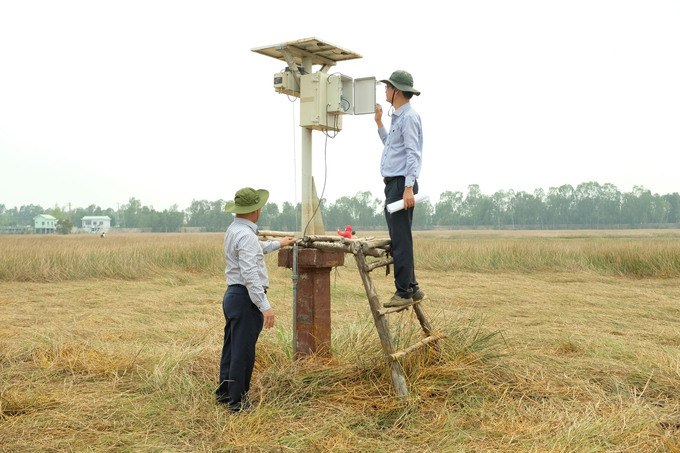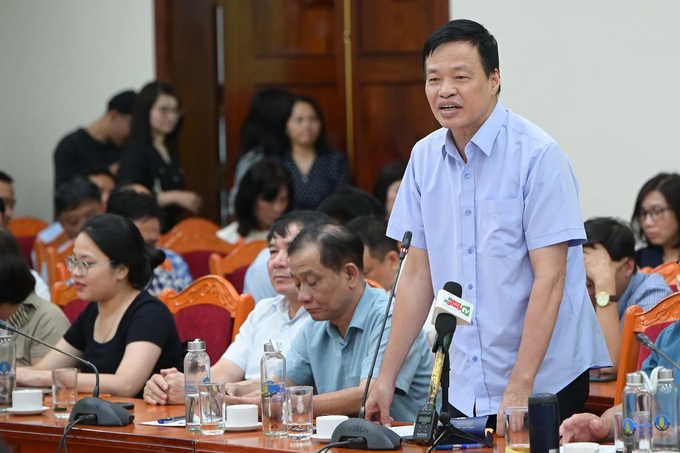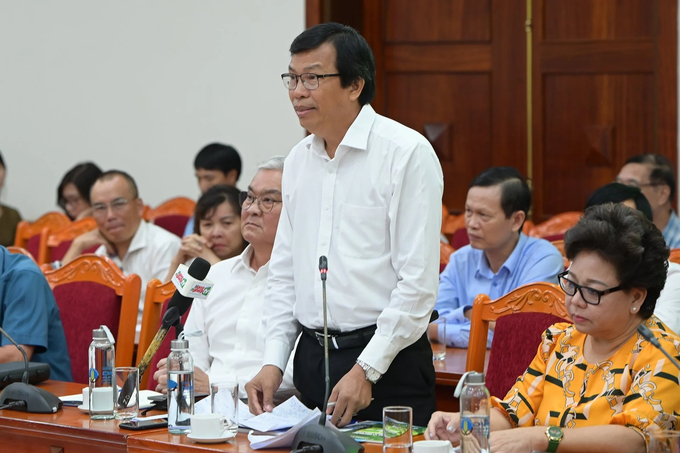May 29, 2025 | 21:19 GMT +7
May 29, 2025 | 21:19 GMT +7
Hotline: 0913.378.918
May 29, 2025 | 21:19 GMT +7
Hotline: 0913.378.918
On July 10, the Ministry of Agriculture and Rural Development organizes a forum to connect agricultural science and technology products with businesses, cooperatives, and the public. Vietnam Agriculture News kindly introduces our readers to insightful conversations in the forum.

AI/IoT-powered dashboard for environmental management at Tram Chim National Park. Photo: Quynh Chi.
Dr. Vo Dai Hai, Director of the Vietnam Academy of Forest Sciences, outlined five issues to promote connection and transfer the results of scientific and technological products (STP).
Firstly, Dr. Vo Dai Hai emphasized that to effectively connect STPs, there needs to be a greater number of high-quality and innovative products. To achieve this, the Ministry of Agriculture and Rural Development has continuously renewed its process of defining and constructing STP tasks. This involves scientists, managers proposing tasks, and the participation of businesses in making recommendations.
Secondly, the Ministry of Agriculture and Rural Development has revamped its implementation organization. After confirming cooperation with businesses, the execution of scientific tasks, conducting experimental production, and implementing projects for agricultural promotion are crucial steps in transferring results. "For example, the Australian sugar apple variety, highly regarded by international experts, has achieved superior productivity and quality in Vietnam. When this information was publicized, Vietnam Agriculture Newspaper quickly disseminated the news, thereby facilitating the connection of businesses to new models," Mr. Hai shared.
Thirdly, Mr. Hai suggested that effective communication is essential for connecting and transferring STPs. He also proposed that the Ministry of Agriculture and Rural Development support the digitalization of STPs so that businesses and the public can access them more easily.
Fourthly, there is a need to change the approach: businesses should seek out scientists, and conversely, scientists should also approach businesses to advance STPs.
Lastly, in collaborative STP transfer and connection, integrity must be prioritized.
Dr. Vo Dai Hai recommended that the Ministry of Agriculture and Rural Development focus on infrastructure and equipment, particularly modern facilities, to empower STP organizations to remain proactive in high-tech research and produce excellent products.

Prof. Dr. Vo Dai Hai, Vietnam Academy of Forest Sciences raised 5 issues to promote connection and transfer of scientific and technological product results. Photo: Tung Dinh.
From Can Tho University, Vice President Tran Ngoc Hai shared that the university has implemented numerous significant policies to foster sustainable agricultural development in the Mekong Delta region. Key focuses include agriculture, fisheries, high technology, convenience, environmental friendliness, high quality, and food safety and hygiene.
According to Dr. Tran Ngoc Hai, with nearly 60 years of establishment and development, Can Tho University, driven by its research mission, aims to serve as a connecting hub for agencies, businesses, and partners operating in the Mekong Delta region.
Firstly, with ongoing projects to enhance facilities at Can Tho University supported by both domestic and international sources, particularly in laboratories and farm areas, the university aims to maximize collaboration with businesses, other institutes, and schools to effectively apply science and technology for practical purposes.
Secondly, boasting a workforce of 1,800 staff members, including 1,200 domestically and internationally trained lecturers and scientists, Can Tho University is ready to provide businesses with reliable scientific and technological advice.
Additionally, the university has 45,000 undergraduate, graduate, and doctoral students representing a high-quality human resource pool for the agricultural industry and businesses. Mr. Hai expressed hopes to continue fostering partnerships with businesses to meet the industry's evolving needs in this new era.

Vice President of Can Tho University, Dr. Tran Ngoc Hai, shared that the university has implemented numerous significant policies. Photo: Tung Dinh.
A representative from Can Tho University also emphasized their commitment to promoting the transfer of research outcomes to businesses, facilitating more effective and diversified applications of science and technology in agriculture.
Mr. Nguyen Phu Hung, Director of the Department of Science and Technical Economics (Ministry of Science and Technology), voiced his concerns regarding connecting and integrating science and technology products into practical applications.
Mr. Hung pointed out that although policy mechanisms have not been clearly demonstrated, each of the department's science and technology support programs sets criteria for business participation, which is a mandatory requirement to expedite the application of science and technology.
With approximately 20 national science and technology programs in place, Mr. Hung urged scientists and businesses to collaborate closely. “We encourage businesses to present practical challenges that can guide us and scientists towards finding funding solutions. This collaboration will facilitate the rapid deployment of science and technology projects and the swift realization of products into practical applications.”
Prof. Dr. Vo Dai Hai and Prof. Dr. Tran Ngoc Hai underscored the efforts to connect scientific and technological products with practical applications, highlighting the importance of collaboration between academia, businesses, and government bodies.
Moving forward, concerted efforts to enhance collaboration and resource allocation will be essential in realizing the full potential of scientific research for the benefit of agricultural industries and broader societal needs.
Translated by Quynh Chi
/2025/05/25/4127-3-073637_820.jpg)
(VAN) Thanks to the promotion from an FAO-implemented project, vegetable production in greenhouses in Moc Chau has seen strong development, from 1.5 hectares in 2021 to nearly 50 hectares in 2024.

(VAN) FAO has recently supported USD 140,000 to implement the project 'Risk mitigation human-animal interface risks through disease control initiatives in pig farming.'

(VAN) The People's Committee of Tra Vinh province has approved an adjustment to the investment policy for the Green Hydrogen Plant project, increasing its area to approximately 52.76 hectares.
![Reducing emissions from rice fields: [2] Farmers’ commitment to the soil](https://t.ex-cdn.com/nongnghiepmoitruong.vn/608w/files/news/2025/05/05/dsc08881jpg-nongnghiep-140632.jpg)
(VAN) Clean rice cultivation model in Thuong Tan commune, Bac Tan Uyen district, is assisting local residents in achieving sustainable agriculture by substantially reducing costs, increasing productivity, and protecting the environment.

(VAN) At the conference to disseminate Resolution No. 68, AgriS introduced its digital agricultural ecosystem and reaffirmed its commitment to accompanying the Government in promoting private sector development and sustainable agriculture.

(VAN) 'Blue Ocean - Blue Foods' initiative is designed to restore marine ecosystems and establish sustainable livelihoods for local communities by cultivating a minimum of 1,000 hectares of cottonii seaweed in the first three years.
/2025/05/21/4642-3-112707_603.jpg)
(VAN) The V-SCOPE project has made direct contributions to three out of six pillars of the Comprehensive Strategic Partnership between Vietnam and Australia.